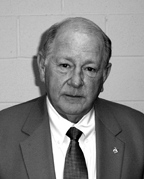 | Steve Shaffer served in the U.S. Army from 1964 – 1966. After serving his country Steve continued giving back by serving as a Law Enforcement Officer for 25 years, retiring in 1992. While working as a Law Enforcement Officer Steve continued his education at WSU where he earned a Masters Degree in 1975. He has attended numerous workshops relating to Anger Management, Domestic Violence, Psychotherapy, Addictions Counseling, and with Ethics and Professional Development. Steve worked in addiction counseling for the past 6 years. In 2003 Steve started his own drug & alcohol outpatient treatment program, called A New Dimension you may visit him at 2422 S. Seneca Ste. A or he can reach by calling 265-8600 |
Rehabilitation and Therapy
2007-06-01 09:43:00
Are there replacement drugs for addiction?
Are there replacement drugs that will help overcome addictions?
Answer: For years people in the drug rehab field have been trying to focus most of their time and efforts into developing drugs to overcome addiction, but treating a chemical problem with more chemicals has never produced long-lasting, stable results in a rehabilitation environment.
The latest push is for the use of extended-release injectable naltrexone for alcoholism. However, Naltrexone is an opiate blocker and no one really knows how, or if, it will work with alcohol. This guessing game – let’s try this and see if it works - is another reason why giving addict’s replacement drugs doesn’t work for long-term recovery.
Other problems with Naltrexone include side effects such as nausea, vomiting, decreased appetite, drowsiness, fatigue, headache, dizziness, anxiety and, in some cases, suicidal thoughts and behavior. Also, the recommended dose of 380 mg. injected intra-muscularly, hasn’t been tested to find out what affect it will have on the liver – it could result in toxicity.
Who would want to subject themselves to that? Alcohol and drug rehab programs are supposed to detoxify, not introduce more toxins. A successful alcohol or drug rehab program works by finding alternative solutions to problems in life that caused the person to turn to drugs or alcohol in the first place, and thereby reducing the desire to drink.
The results of Naltrexone speak for themselves - a six-month study showed only limited reduction in the number of heavy drinking days, and little effect on abstinence. That doesn’t seem effective to me. Really successful drug and alcohol programs fix the body, get the person in better shape physically, and address the underlying issues that got them there in the first place.
Is medical detoxification really needed for a successful rehab?
Most people’s definition of detoxification is simply just withdrawing from the drug. In most cases, a medically-supervised withdrawal is not necessary, especially with most stimulants and even painkillers and heroin, although it is common with the latter two.
Even though a common aide is to have someone ‘sleep it off,’ alcohol and some other drugs can be very difficult to withdraw from when a person is consuming large quantities. Medical detoxification helps someone to systematically withdraw from alcohol or drugs by reducing the amount and/or using other medicines to ease the process and eliminate the risk of seizure and other severe drug withdrawal symptoms.People most often wanting or needing a medically-supervised detoxification before beginning addiction treatment include those on benzodiazepines (Xanax, Valium), opiates (prescription painkillers, heroin, methadone), barbiturates (Phenobarbital) and heavy amounts of alcohol.
One main problem with this is, though, that many drug users will try to stop their treatment after detoxification thinking that their problem is solved, but in actual fact they are much better off statistically to go into a longer-term drug-free residential rehabilitation program after detoxification.
In recent years there have also been other classes of prescribed drugs that require medical detox to step down from. These drugs include antipsychotics (Zyprexa, Risperdol, Seroquel), antidepressants (Paxil, Prozac, Wellbutrin, Zoloft, etc.) and other mind-altering prescriptions.
Given that more information and side effects of these drugs are discovered each year, more and more people are deciding to not take them and are seeking alternative treatments.
These types of drugs have very severe withdrawal symptoms and people coming down from them often experience sudden psychotic episodes, so stepping down gradually in a medically-supervised environment is highly recommended over gradually detoxing at home.
Some information obtained from Addiction Help Services.


